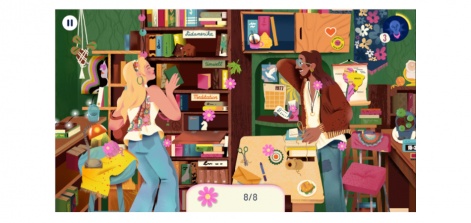Fein Games Lea Schönfelder: “We firmly believe that if you want to change someth | Pocket Gamer.biz

Fein Games is a female-led studio passionate about telling stories featuring the female perspective. This can be seen in the studio’s title, Finding Hannah, a hidden object game set in Berlin that tells the story of three women. However, it isn’t just within Fein’s games where inclusivity is important. The studio is also attempting to change the standards of workplace culture.
We caught up with Fein Games co-founder Lea Schönfelder to discuss her history in the gaming industry, how Fein came to be, and the future goals for the studio with its core outlook on creating a fair workplace.
Pocketgamer.biz: Can you tell us about yourself and your history in the games industry?
Lea Schönfelder: Ending up in games was almost an accident for me. I studied illustration and animation at art school and only through a collaboration with the New Media department stumbled into interactive experiments. My first game, Ulitsa Dimitrova, originated at that time. It is a game about a street kid in St. Petersburg and won a student award at the IGF.
I then released artistic games as an indie developer, and afterwards, I thought I needed to get my feet dirty in the “real” games industry. I started as Game Designer at Flaregames and later worked as Senior Designer on Monument Valley 2 for ustwo games, which was a big honour because the original Monument Valley was and still is one of my favourite games. As someone with a more artistic background who hadn’t played many games until I was an adult, I admired the inclusive design and UX of the Monument Valley series.
At ustwo games, I stepped into my first leadership position as Lead Game Designer on Assemble with Care, which was an Apple Arcade launch title. It was both fun and a challenge working on the next title after the Monument Valleys, and I was named a BAFTA Breakthrough in the UK for the work on it.
After a short stop as Production Manager at Nerial, the makers of the Reign series, I took the leap going full-time as Co-Founder of my own studio, Fein Games.
How did the creation of Fein come about? What are your hopes for the studio going forward?
Franziska Zeiner and I co-founded the studio in 2020. About a year before, I was on maternity leave, and we started discussing the idea of founding our own business.
At ustwo games, as well as Nerial, I was increasingly interested not just in the specific games we made but also in how we made them and how the studios were run.
I started to form my own ideas, some of them you could argue were radical. For example, I think that all disciplines of game development should be paid the same because they all contribute to a good game. However, the market reality is that traditionally male jobs, such as programmers, are paid more than roles that women, such as artists, often hold. Franziska and I actively work towards closing the gender pay gap by being discipline-agnostic at Fein Games.
Franziska and I both envision making games better for everyone: developers, players, and society. That’s what we’re working towards, and that’s why we founded Fein Games.

Fein already has one game, Finding Hannah, which is on mobile and Steam. Is cross-platform gaming going to be a focus of upcoming projects?
Yes. I mustn’t lie; game development is currently tough for small studios. On the mobile market, f2p is the most prominent business model, yet even that model has become so difficult to run that it is almost exclusively big players that succeed with new titles on the market. However, we don’t want to give up mobile game development, as we still believe in phones and tablets as meaningful gaming devices that are accessible to so many people, especially players who aren’t dedicated gamers yet.
Steam is a platform with a lot of competition as well, and the f2p model is entering the market. But players are still more willing to pay a sustainable price point making it a valid option for indies. The third important market is consoles, where maybe the biggest potential lies for quality indie developers. However, competition is intense there as well.
When I started out making games, it felt like if you deliver a good product and get picked up by the press or even win awards, you’ll reach a lot of players. This is not the case anymore. Even Indie developers have to think about accessing their audience early on, and positioning themselves on the market becomes the most critical challenge for any game studio.
Returning to your question: yes, cross-platform is our strategy now as we work towards expanding our revenue streams. It is also one that we are following with passion as, on all platforms, audiences become more diverse, and we love making our games accessible to a variety of players on their favourite gaming devices.
Fein is a female-led company. What does having such a prominent female presence at the studio mean to you?
For most of my career, I’ve worked in teams where men made important decisions. While I personally felt that I’ve had male supporters, I also felt the structural difficulties that you face as a female employee in male-led teams, for example, when it comes to creative decisions. Any vision that you could label as being a bit softer, maybe more “female”, I had to argue for extra hard. When I wanted to design a mellow, meditative experience, I’ve had male team members asking for more friction, more existential threat for the main character. In retrospect, when cosy games are now a big thing, I think it is almost funny, and I wonder if this would still be happening today. But it was a reality for me at the time!
At Fein Games, we think about being a feminist business a lot and what it means. We want to improve the workplace, not just because we think it’s nice if our employees have a good private life and time to do care-work, for example. But also because we think it makes sense from a business perspective. With the vision we promote at Fein Games, it is easy for us to find and retain new talent. People take fewer sick days and are generally motivated. If you think about it that way, we’re saving a lot of money!
When we spoke at Develop, you mentioned that Fein is run differently from many other studios. Can you tell us a little about progression at the studio? What are some of the ideals that you find important in the workplace?
At Fein Games, we firmly believe that if you want to change something about the industry, you have to do it from the ground up, from the substance your teams are built from. So we’re working towards a diverse group with different backgrounds to enrich the experiences we are creating.
We’re also fostering a culture of transparency and trust. For example, we expect our employees to do their best job at any time. As a result, that means that we are not linking an employee’s individual performance to their progression in the company, as we already know they are giving what they can.
We believe in the intrinsic motivation of employees rather than extrinsic. That means that employees automatically climb one step in our progression ladder every year.

What is the focus at Fein for the rest of 2023, and is there anything we should look out for?
We’re exploring several exciting opportunities at the moment. Prototyping new concepts is one of them, but almost more important at this point is how we position Fein Games as a future-facing company in a market that is transforming on several levels. It’s exciting, overwhelming at times, but – and this is what I love about my industry – there is room for us to shape the direction in which we want to go as a medium.
